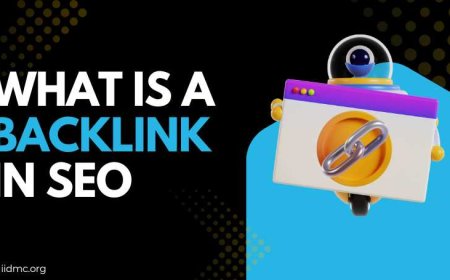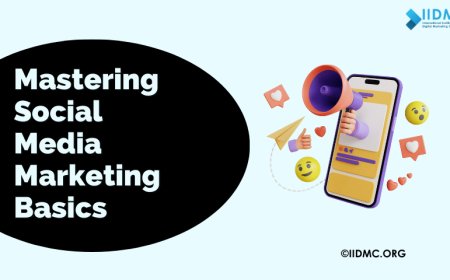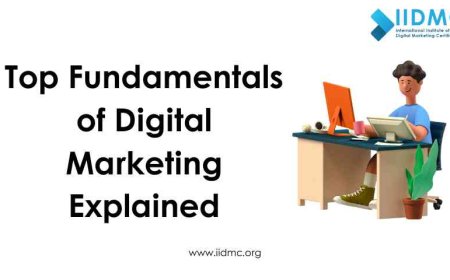Everyone Talks About Content Marketing — But No One Does It Right
Most brands talk about content marketing but rarely get it right. Learn how to create powerful, engaging, and result-driven content that stands out online.
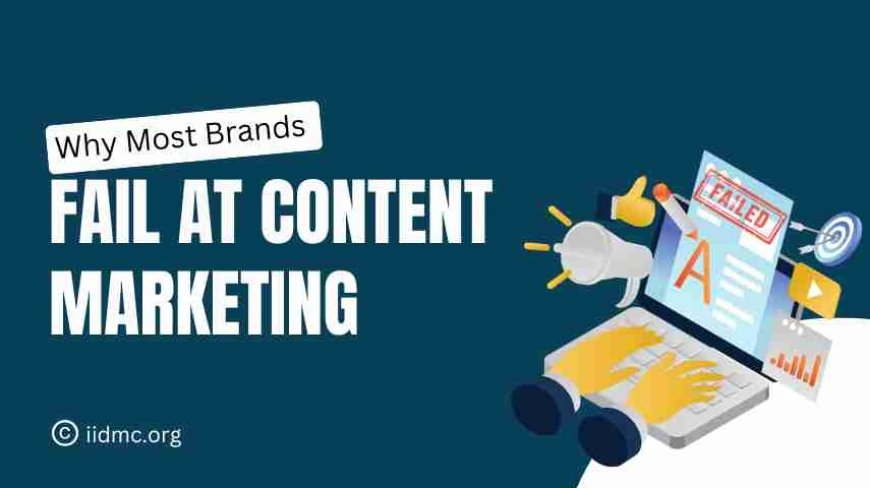
Why do so many brands talk about content marketing but still fail to do it right? Every business wants viral posts, engaging blogs, and catchy videos, but few understand how to make content truly connect. Content Marketing is about creating strategy, consistency, and real value for your audience.
In Digital Marketing, everyone claims to do content marketing, yet most miss the real purpose. Without proper skills, research, and planning, content turns into noise. That’s why learning the right methods and getting a Content Marketing Certification helps you create content that truly stands out.
What Content Marketing Really Means
People think Content Marketing just means posting blogs, videos, or social media updates, but it’s much more than that. It’s about creating valuable and meaningful content that attracts, educates, and inspires your audience while building trust with your brand.
Content Marketing is a long-term strategy focused on giving your audience something useful before asking for anything in return. It helps businesses grow by turning readers or viewers into loyal customers through consistent and relevant communication. Here’s what Content Marketing really means:
-
Creating valuable content: Share information that helps, educates, or entertains your audience.
-
Building relationships: Focus on trust, not just promotion.
-
Consistency matters: Regular content builds brand recognition and credibility.
-
Solving audience problems: Address real needs instead of only selling products.
-
Using different formats: Blogs, videos, infographics, emails, or podcasts — all are part of content marketing.
-
Driving long-term results: Great content continues to bring leads and engagement over time.
Why Most Businesses Fail at Content Marketing
Many businesses talk about Content Marketing, but only a few see real results. The reason is simple, they focus more on creating content than on creating a strategy. Good content alone isn’t enough. Without a clear plan, purpose, and understanding of the audience, even the most creative campaigns fall flat. Here are the main reasons most businesses fail at content marketing:
-
No clear strategy: Many brands create content randomly without defining their goals. They don’t plan what type of content to produce, who it’s for, or how it supports business objectives. Without direction, content becomes inconsistent and ineffective.
-
Lack of audience understanding: Businesses often fail to research their audience’s interests, challenges, and preferences. They create what they think is good, not what the audience wants.
-
Inconsistent posting: Consistency is key in building trust. Irregular posting makes audiences lose connection with the brand, reducing engagement and visibility.
-
Ignoring SEO: Without proper keyword research and optimization, even valuable content can’t reach the right audience. SEO ensures your content ranks and gets discovered online.
-
No performance tracking: Many companies don’t measure how their content performs — no tracking of engagement, leads, or conversions. Without data, they can’t improve or make informed decisions.
-
Untrained teams: A lack of formal training or Content Marketing Certification means marketers miss out on structured learning, strategy building, and the latest best practices.
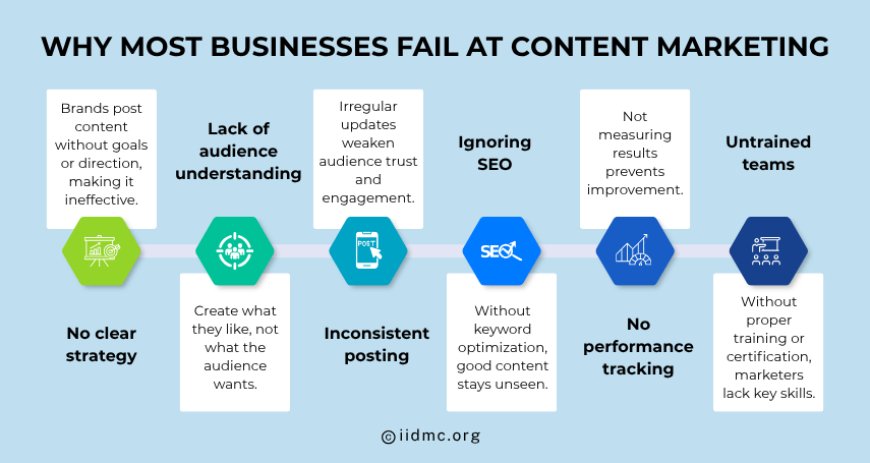
What Doing Content Marketing “Right” Actually Looks Like
Doing Content Marketing right means creating a thoughtful, consistent, and data-backed process that connects your brand with your audience. It’s about understanding who your customers are, what they need, and how your content can solve their problems. Here’s what successful content marketing looks like:
-
Audience-first approach: Start by studying your audience — their age, interests, needs, and online habits. This helps you create content that feels relevant and personal.
-
Strategic planning: Every piece of content should serve a purpose. Create a plan that defines what you’ll publish, where, and when. A content calendar helps maintain order and consistency.
-
Quality over quantity: Publishing fewer, high-quality pieces is far better than flooding platforms with low-value content. Focus on accuracy, depth, and creativity.
-
SEO integration: Great content must also be visible. Optimizing your content with keywords, headings, and links ensures it reaches more people.
-
Consistent branding: Your tone, style, and message should align across all platforms. This builds recognition and trust.
-
Analytics and improvement: Regularly track metrics like traffic, engagement, and conversions. Use data to adjust strategies and create even better content.
-
Content diversification: Use different formats — blog posts, infographics, podcasts, videos, or newsletters — to engage your audience in multiple ways.
The Role of Content Marketing Certification
A Content Marketing Certification plays a important role in helping professionals learn how to plan, create, and manage effective content campaigns. It’s not just about writing, it’s about understanding strategy, analytics, and storytelling. Here’s why certification matters:
-
Structured learning: Certification programs provide a clear roadmap from understanding content strategy to mastering promotion and analytics.
-
Audience research skills: You learn how to define your audience and create content that addresses their exact needs.
-
SEO and analytics knowledge: Certifications cover how to research keywords, track content performance, and use data to improve results.
-
Professional credibility: Being certified builds trust. Employers and clients see you as someone who has proven skills in content and Digital Marketing.
-
Latest industry insights: Certification programs update regularly, ensuring you stay current with tools, algorithms, and best practices.
-
Confidence and clarity: Certification gives you a strong foundation, helping you make smarter decisions when planning and executing campaigns.
How a Certified Content Marketer Stands Out
A certified content marketer brings more than just creativity; they bring structure, analysis, and strategic thinking to every project. Certification ensures that the person not only understands how to create content but also how to align it with business goals. Here’s how certified professionals stand apart:
-
Strategic approach: Certified marketers plan content with clear objectives in mind — awareness, engagement, or conversion. Every piece serves a specific role in the customer journey.
-
Data-driven mindset: They use analytics to measure success. Instead of guessing what works, they rely on insights from tools like Google Analytics, SEMrush, or HubSpot.
-
SEO expertise: They know how to optimize content for search engines, helping it rank higher and attract the right audience.
-
Effective storytelling: Certification programs teach the art of storytelling, helping marketers create emotionally engaging content that strengthens brand connection.
-
Credibility and professionalism: Having a recognized certification signals to employers and clients that you’re skilled, trained, and serious about your profession.
-
Efficient campaign management: Certified marketers can manage workflows, tools, and teams more effectively, ensuring better campaign performance.
Steps to Learn Content Marketing
Learning Content Marketing requires both creativity and technical understanding. To become skilled, you need to follow a structured approach that helps you understand every aspect — from planning to performance analysis. Here’s a step-by-step path to learn content marketing:
-
Understand the basics: Start by learning what content marketing is, how it works, and why it’s crucial in today’s digital field.
-
Study your audience: Learn to identify who your audience is, what problems they face, and what content formats they prefer.
-
Learn SEO: Understanding keyword research, link building, and on-page optimization helps your content reach more people.
-
Take a Content Marketing Certification course: A structured program teaches strategy, writing, analytics, and promotion — giving you a solid professional foundation.
-
Practice consistently: Create your own blogs, social media posts, or video content. Real practice builds experience and confidence.
-
Use tools and analytics: Learn how to track performance using tools like Google Analytics, Ahrefs, or HubSpot. This helps you measure what works and what doesn’t.
-
Stay updated: The digital world changes quickly. Keep learning new trends, formats, and algorithms to stay relevant.
Best Institute for Content Marketing Certification
If you’re looking to learn Content Marketing and build a successful career in Digital Marketing, then IIDMC (International Institute of Digital Marketing Certification) is one of the best places to start. IIDMC is known for its globally recognized Digital Marketing Certification training programs that combine theory with real-world application, helping learners understand how to plan, create, and execute powerful content strategies.
At IIDMC, the Content Marketing Certification program is designed to help you develop strong skills in storytelling, SEO writing, content strategy, and performance analysis. The course covers everything from understanding audience behavior to creating content that drives engagement and conversions.
Why choose IIDMC for Content Marketing Certification:
-
Globally recognized institute: IIDMC certifications are respected worldwide, making you stand out in the job market.
-
Comprehensive curriculum: The program includes content planning, copywriting, SEO, analytics, and content distribution.
-
Industry-relevant training: Learn from professionals with years of experience in Digital Marketing and content creation.
-
Hands-on learning: Gain practical experience through real-world projects and case studies.
-
Career growth opportunities: IIDMC certification boosts your profile and opens doors to top marketing roles globally.
Choosing IIDMC means choosing a path toward expertise, credibility, and success in the world of content marketing. Whether you’re a beginner or a marketing professional, this certification will help you create impactful content that truly delivers results.
Common Myths About Content Marketing
There are several misconceptions about Content Marketing that often confuse beginners and even professionals. Believing these myths can stop you from building an effective strategy. Let’s break them down:
-
Myth 1: Content marketing is just about writing blogs.
In reality, it involves multiple formats — videos, infographics, podcasts, social media posts, and case studies. All of these work together to educate and engage your audience.
-
Myth 2: SEO alone makes content successful.
SEO helps with visibility, but engaging and valuable content keeps people interested. Search optimization and quality writing must go hand in hand.
-
Myth 3: Anyone can do content marketing without training.
Without proper strategy or knowledge, content often lacks focus and results. Professional training or certification helps build the right skills.
-
Myth 4: Content marketing works instantly.
It’s a long-term investment. Building brand awareness, trust, and organic traffic takes time and consistency.
-
Myth 5: More content means better results.
Posting too much without a clear plan can confuse audiences. It’s better to produce fewer, well-researched, and purposeful pieces that truly add value.
Understanding these truths helps businesses and marketers approach content marketing with a realistic mindset. Success comes not from doing more, but from doing it smartly and strategically.
Content marketing is about delivering real value to your audience through strategy, consistency, and creativity. Many businesses talk about content marketing but fail to connect it with their overall goals. Doing it right means understanding your audience, crafting meaningful stories, and measuring your results. With the right approach and proper training, like a Content Marketing Certification from a trusted institute, you can master the skills to create content that truly drives engagement and builds long-term brand success.



























